
LIBRI DI RICCARDO PRANDINI
La ricerca ha estratto dal catalogo 58 titoli


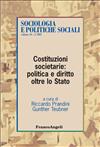
I concetti di costituzionalismo e costituzione e i processi di costituzionalizzazione, nati e sviluppatisi in un contesto sociale dominato dagli stati-nazione, sono oggi messi in discussione dalla globalizzazione, che genera la società-mondo. Alla luce di tale rischio, il volume si interroga sul ruolo che potrà rivestire il diritto nel necessario tentativo di limitare i sempre più irresponsabili poteri che tendono a colonizzare e alienare il sociale.
cod. 1534.4.29
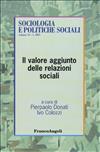
I risultati di una ricerca PRIN (2007), intitolata Reti societarie, capitale sociale e valorizzazione dei beni pubblici, che ha avuto l’obiettivo di analizzare sul piano quantitativo e qualitativo come il capitale sociale contribuisca a valorizzare i beni pubblici. I contributi presentati danno indicazioni su come intendere e misurare il capitale sociale e i beni che esso produce.
cod. 1534.4.28

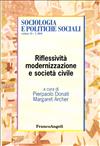
La nostra società potrà superare la sua crisi solo se saprà cambiare il suo modo di intendere e praticare la riflessività, sia dei soggetti individuali sia dei soggetti sociali, mediante un’adeguata riconfigurazione societaria. Il testo propone delle precise analisi sociologiche che spiegano perché e come ciò possa avvenire.
cod. 1534.4.25

Un Piano di politiche familiari
La conciliazione tra lavoro professionale e cura della famiglia: il volume presenta il caso italiano, collocandolo nel contesto internazionale. Vengono affrontati i temi dei servizi per l’infanzia, voucher e titoli di accesso per la conciliazione, i sostegni alla maternità e alla paternità, il tema della famiglia come stakeholder dell’azienda, le esperienze innovative di conciliazione nei paesi di lingua. Infine, viene fornito uno schema di possibile Piano nazionale di politiche per la famiglia.
cod. 1130.238
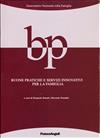
cod. 2000.1142
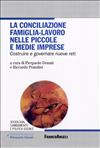
Costruire e governare nuove reti
La ricerca intende gettare nuova luce sul tema della “conciliazione” tra famiglia e lavoro, un aspetto rilevante per la nostra vita quotidiana e per il mondo del lavoro. Il volume, partendo dalla realtà delle piccole e medie imprese della provincia di Bologna, offre un nuovo scenario di possibili soluzioni per il nostro Paese.
cod. 1534.2.30
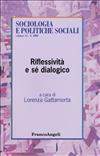
Avendo sullo sfondo la tradizione che affonda le sue radici nel pragmatismo americano e nell’interazionismo simbolico di Mead, il volume propone un’analisi della relazione tra riflessività personale e dimensione dialogica del sé. Tenendosi lontani dagli scogli del sociologismo e del postmodernismo, i saggi presentati intendono ritrovare una giusta collocazione a un sé che è incastonato nelle relazioni sociali e linguistiche, ma che sempre le eccede attraverso la riflessività.
cod. 1534.4.21
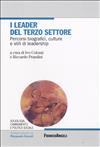
Percorsi biografici, culture e stili di leadership
Un primo ritratto della leadership del Terzo settore: caratteristiche socio-demografiche dei responsabili, percorsi biografici, profili religiosi e politici, percorsi lavorativi, orientamenti culturali, stili di leadership, visione del futuro del Terzo settore.
cod. 1534.2.25

In this paper the author tries to show what it means to organize and deliver new subsidiary relational services. Subsidiarity is not only a political value or a more efficient (economic) way to provide services. Subsidiarity is a new way to organize relational services, i.e. services that work on relationships. From this point of view, the subsidiarity of a given service is an emergent property generated by a special kind of reciprocal orientations between the actors of the service itself. This special reciprocity is based on practices of (meta)reflexivity. The categorical imperative of subsidiarity is: act in such a way as to make possible for everyone to act at his/her best, developing his/her personal skills and competences in order to make others act in theirs. Thus, subsidiarity is an eigenvalue, which emerges from these reciprocal orientations. To act in a subsidiary way is to act reflecting about and across the relationships that make the service possible. It is not simply to act in the best individual way possible, but to act for, with, from and in order to improve the relationship with others. Reflections about our ways of acting, and (meta) reflections about the influence everyone’s actions have upon the actions of others, are here at stake. So, supplying a subsidiary relational service means leaving the modern system based on the values of individual competence-bureaucracy-working skills-aggregation of output, to develop a new system based on the values of relational competence-responsibility-duty-emergence of outcome. In this paper this new vision is illustrated by a case study dedicated to a service named Giocoamico, provided by the Hospital of Parma. The case study is only conceived to be a euristic device, which is useful to develop new scientific observations on the emergent field of subsidiarity relational services.


Family’s Social Capital: definition, measurement and subsidies (by Riccardo Prandini) - The first purpose of this essay is to explain why in the debate about Social capital, which spread across the social scientific community in the last two decades, the family as a social relationship had no real import. In the first part of the essay, Prandini finds the answer in what he calls the modernist theoretical bias, a set of sociological prejudices (operative in different theories: rational choice, functionalism, system theory, structuration theory, etc.) which considers the family relationship as a sort of organic relict of pre-modern societies, a constraint for social development and an obstacle for the full deployment of less bonding social relations. Prandini criticizes this way of thinking and, in the second part of the essay, tries to suggest a new way for defining, measuring and subsidizing the family social capital. The family’s social capital, now embedded in the relational approach, is defined as a property and a quality of social relationships and not as an attribute of individuals or social structures; it is not a mixture of the two either. It represents that reciprocal orientations of the family’s members which, through processes of social condensation, are able to generate trustworthiness and so to engender cooperative actions ad experiences. This special kind of Social capital must be differentiated in: 1) nuclear social capital, and 2) kinship social capital (the latter including relationships with non-co-resident relatives). Furthermore, the former (nuclear social capital) can be analytically examined, differentiating it in conjugal social capital, parental social capital and brotherly social capital. Only by distinguishing these different kinds of social capital is it possible to study their actual relationships. Studying the interplay between nuclear and kinship social capital also means that the sociologists has to include time in his concepts and analysis. Only in this way is it possible to observe the generations and degenerations, the morphogenesis and morphostasis of family social capital. The third part of the essay is dedicated to the operazionalizations and measurements of social capitals. The Author suggests that each operazionalization depends upon the research design, and that it is not useful to introduce only one way to do it. Moreover, there are good reasons for utilizing a certain kind of definitions and measurement in order to develop quantitative research, and various other good reasons when the sociologist carries out a qualitative research. Nowadays network analysis provides new methodologies and measurement systems that are particularly useful to develop in deep research about social capital. The Author concludes his essay calling for new ways of subsidizing the family social capital. He suggests that the modern social welfare system is currently not skilled enough to sustain the processes that generate social capital, and that it is time to shift to a new kind of welfare, one we may call societal and pluralistic.
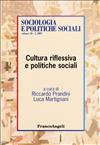
Una nuova cultura riflessiva, una capacità di auto-osservarsi stabilmente in modo critico al fine di cambiare per adeguarsi a relazioni sociali più giuste ed eque. Un’esigenza individuale e istituzionale che, nel continente europeo, cozza contro le “vecchie” tradizioni liberal-democratiche e social-democratiche, produttrici di omologazione e monocultura.
cod. 1534.4.18
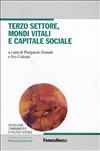
Il volume espone i risultati di una ricerca, su un campione rappresentativo dell’intera popolazione, che ha avuto l’obiettivo di fare una “mappatura” quanti-qualitativa del Capitale sociale in Italia. L’indagine mostra in particolare che: le reti parentali sono ancora le più forti rispetto alle altre reti sociali; le reti comunitarie extra-parentali producono poco Cs e si affidano più agli amici a distanza che ai vicini; la fiducia nelle istituzioni politiche rimane a livelli scarsi, con una distribuzione territoriale fortemente disuguale…
cod. 1534.2.22

Body to Body with the Pain. A Short Reflexion on Pain and Global Society (By Riccardo Prandini) Apparently, our society is marker by a paradox. On one side, through technical systems we are transforming nature in order to prevent risks, dangers and therefore pain – Artificialization of Nature. Pain, according to our philosophical tradition is something that is unfair and must be avoided. On the other side, many scientifical efforts tries to transform “metanatural” phenomena in natural ones – for instance the “biologization” of cognitions, emotions and of the “social”. On these basis, Prandini develop a set of reflections that concern the opportunity of avoiding the pain if this imply to erase the “human” that is the premise of the pain.

This essay explores the recent efforts to shape “social Europe” into a frame that is functional to economic development and social cohesion. Current processes are analyzed, with the aim of understanding whether Europe is marching toward a unified model of social policy or only a loose convergence among welfare programs. A process of convergence is identified that tends to establish an “active” european welfare state mainly targeted at supporting women-mothers and their children. This “mother-friendly” model has the goal to maximize resources for the European economic development. However, it results in making family invisible, thereby fueling the very problems it wants to solve. The welfare state is supposed to “defamilise” society. As a result of this, such ambivalent and contradictory processes arise as selective inclusion through employment, workfare creation, individualization and contractualization of social ties, homologation and a social disciplinary effect. The paradoxical result is to engender those very problems the European welfare system is supposed to be solving, and to stick family into latency, although to Europeans it remains the source of social ties.
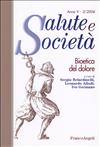
cod. 1341.17
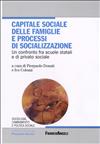
Un confronto fra scuole statali e di privato sociale
cod. 1534.2.20